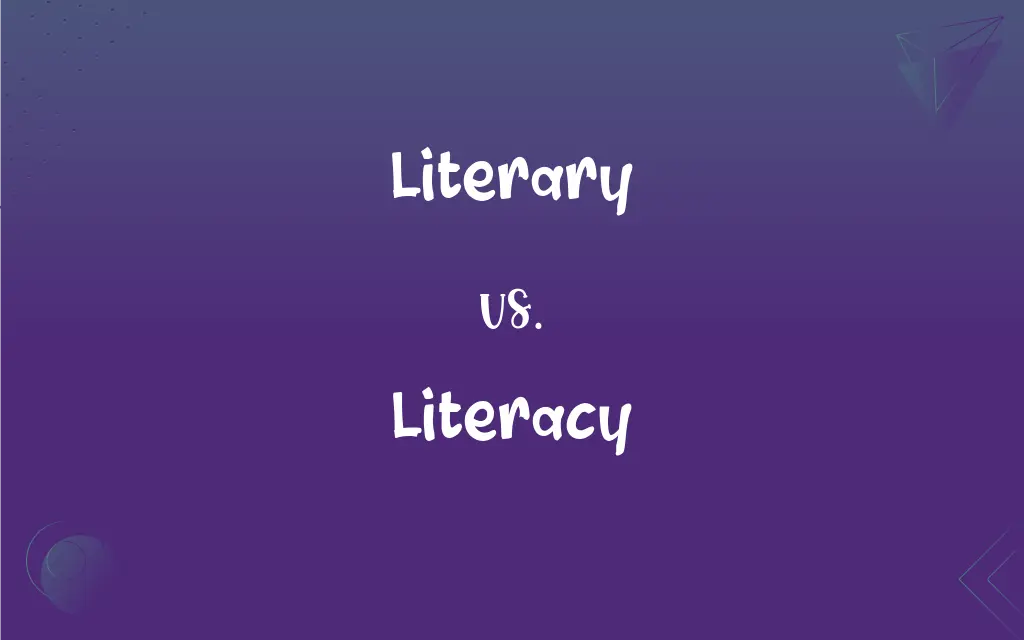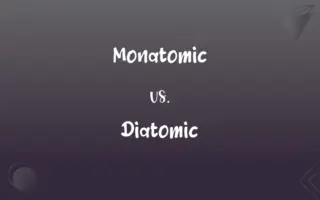Literary vs. Literacy: What's the Difference?
Edited by Aimie Carlson || By Harlon Moss || Published on December 24, 2023
Literary refers to literature or writing. Literacy refers to the ability to read and write.

Key Differences
Literary refers to anything pertaining to literature, such as literary works, criticism, and theory. It encompasses the artistic and nuanced use of language. Literacy, on the other hand, is a fundamental skill, referring to the ability to read and write effectively. While literary works are enjoyed by those who appreciate artful language, literacy is a basic educational requirement.
The term literary is often used to describe a sophisticated or refined use of language in texts, indicating a deep understanding of literary devices and styles. Literacy implies the competence to interpret and create texts, crucial for communication and knowledge acquisition. Literary works challenge literacy skills by requiring higher levels of comprehension and interpretation.
In the context of education, literary knowledge involves studying various genres, historical contexts, and authorial styles. Literacy, however, is more about developing the skill to read and write, including grammar, vocabulary, and syntax. Literary appreciation requires a certain level of literacy, but literacy does not automatically imply a grasp of literary concepts.
Literary pursuits often include critical analysis, creative writing, and in-depth study of texts. This contrasts with literacy, which is more about the practical application of reading and writing skills in daily life. While literary pursuits are often academic or artistic, literacy is a fundamental skill for everyday communication and functioning.
A literary person might engage in writing poetry or analyzing novels, showcasing a deep engagement with language and its artistic potentials. Literacy is essential for such a person, but it also serves everyone in basic tasks like reading instructions, understanding news, or writing emails. While literary skills are specialized, literacy is universal.
ADVERTISEMENT
Comparison Chart
Nature
Artistic, related to literature
Basic skill of reading and writing
Use
In-depth analysis, creative writing
Daily communication, information understanding
Education
Study of genres, styles, criticism
Learning to read and write, basic education
Audience
Enthusiasts of literature, academics
Everyone, for essential communication
Goal
Appreciation and creation of artistic texts
Functional ability to interpret and produce text
ADVERTISEMENT
Literary and Literacy Definitions
Literary
Concerned with writing or the study of literature.
The literary critic offered a new perspective on Shakespeare's works.
Literacy
Competence or knowledge in a specific area.
Computer literacy is essential in today's digital world.
Literary
Associated with authors or the profession of literature.
She attended a literary festival to meet her favorite authors.
Literacy
A measure of education or learning.
The literacy rate in the country has improved significantly over the years.
Literary
Characteristic of the best writing.
His speech was not just persuasive but also had a literary quality.
Literacy
The state of being literate, educated.
Literacy empowers individuals and communities.
Literary
Pertaining to literature.
Her literary talents were evident in her beautifully written essays.
Literacy
Familiarity with literature and written works.
Her literacy in English literature was impressive.
Literary
Having a polished or refined quality in writing.
His literary style is marked by eloquence and rich imagery.
Literacy
The condition or quality of being literate, especially the ability to read and write. See Usage Note at literate.
Literary
Of, relating to, or dealing with literature
Literary criticism.
Literacy
The condition or quality of being knowledgeable in a particular subject or field
Cultural literacy.
Biblical literacy.
Literary
Of or relating to writers or the profession of literature
Literary circles.
Literacy
The ability to read and write.
Literacy
The ability to understand and evaluate something.
Computer literacy; media literacy
Literacy
State of being literate.
Literacy
The ability to read and write
FAQs
What is literacy?
Literacy is the ability to read and write effectively.
How does literacy impact society?
Literacy is crucial for education, communication, and socio-economic development.
Are literary skills important?
Literary skills are important for those interested in literature, writing, or critical analysis of texts.
Can someone be literate but not literary?
Yes, being literate means being able to read and write, while being literary involves a deeper engagement with literature.
What does literary mean?
Literary refers to anything related to literature, such as writing, study, or appreciation of literary works.
Is there a link between literacy rates and economic development?
Higher literacy rates often correlate with better economic development and quality of life.
How is digital literacy related to traditional literacy?
Digital literacy builds upon traditional literacy, adding skills related to digital technology and media.
Are literary skills innate or learned?
Literary skills are mostly learned, though natural talent can play a role.
Can literacy exist without literature?
Literacy can exist independently as it primarily involves reading and writing skills.
Is literary study only about reading books?
Literary study includes reading, analyzing, and understanding literature, often involving critical and creative thinking.
Do literary works always follow standard grammar rules?
Literary works sometimes bend grammar rules for stylistic or artistic purposes.
How do literary genres differ?
Literary genres differ in themes, style, and narrative structure, like fiction, non-fiction, poetry, etc.
Can literacy help in understanding literary texts better?
Yes, good literacy skills are essential for understanding and appreciating literary texts.
Are literary festivals beneficial for writers?
Literary festivals offer writers opportunities for networking, learning, and showcasing their work.
How can one improve literacy skills?
Literacy skills can be improved through regular reading, writing, and educational programs.
What role does literacy play in democracy?
Literacy is vital in a democracy, enabling informed decision-making and participation in civic duties.
What's the role of literary criticism?
Literary criticism analyzes, interprets, and evaluates literary works, offering deeper insights.
Is literary analysis subjective?
Literary analysis can be subjective, as it often involves personal interpretation.
What's the impact of literacy on personal development?
Literacy enhances personal development by improving communication, understanding, and critical thinking.
How does one become a literary scholar?
Becoming a literary scholar typically requires extensive study and analysis of literature, often at a higher educational level.
About Author
Written by
Harlon MossHarlon is a seasoned quality moderator and accomplished content writer for Difference Wiki. An alumnus of the prestigious University of California, he earned his degree in Computer Science. Leveraging his academic background, Harlon brings a meticulous and informed perspective to his work, ensuring content accuracy and excellence.
Edited by
Aimie CarlsonAimie Carlson, holding a master's degree in English literature, is a fervent English language enthusiast. She lends her writing talents to Difference Wiki, a prominent website that specializes in comparisons, offering readers insightful analyses that both captivate and inform.






































































